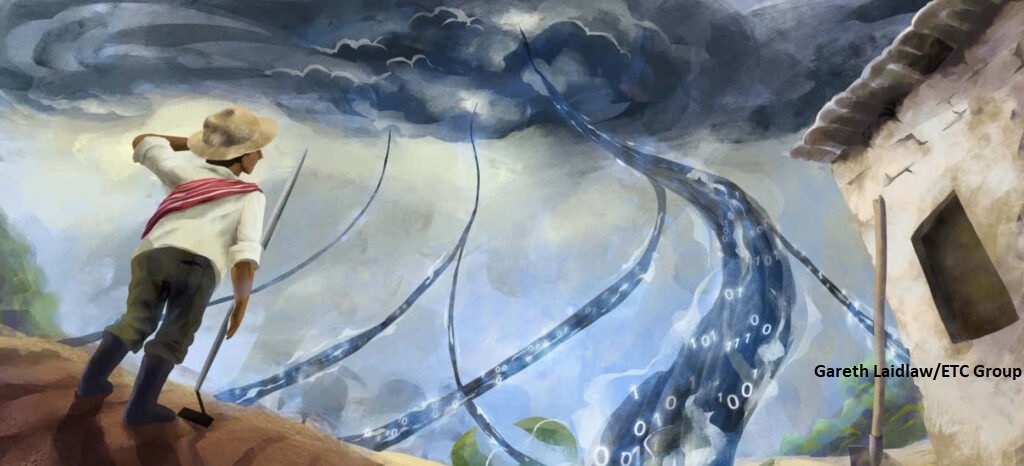Data for Food Security and Nutrition: CSIPM Vision Statement

This vision statement has been drafted by the Civil Society and Indigenous Peoples’ Mechanism’s (CSIPM) Data working group, with the participation of individuals and organizations from different regions and constituencies who work around the digitalization of the food systems or cope with its impacts and who experience both the benefits and the risks of digital technologies. This document is a work in progress. We encourage additional insights into this vision.
CLICK TO EXPAND THE PREAMBLE
We, the Civil Society and Indigenous Peoples’ Mechanism (CSIPM), acknowledge that achieving food sovereignty, fulfilling the human right to food and nutrition for all, upholding the rights of peasants and Indigenous Peoples, and protecting our environment and biodiversity require critical attention to technologies, old and new, that are shaping our food systems. At the same time, technology must advance without trapping the process of appropriation of the heritage by future generations while adapting to their environment.
Because of the current vulnerability of the world, due to the combined effects of climate change, wars and other conflicts, all decisions related to food systems should not be taken without the consultation, involvement and participation of all stakeholders, including social movements and Indigenous Peoples. Civil society organizations, social movements, scholars, and governments must come together to carefully analyze the issues surrounding the collection and use of data, as data that can’t be considered apart from the digitalization all along our food systems, and the implications for our communities long term.
According to the CFS, “Data refers to any set of codified symbols representing units of information regarding specific aspects of the world that can be captured or generated, recorded, stored, and transmitted in analogue or digital form.”
With corporations and economically powerful countries in control of the infrastructures that enable data tools, our hopes and dreams for food sovereignty, the production of food in harmony with Nature, and our very existence as peasants, fishers, pastoralists, rural workers, and Indigenous Peoples are at stake. Digital technologies and processes affect landscapes, communities, and production systems globally, but also reshape our very perception of the food systems through the inclusion or exclusion of “data that counts” and therefore what food futures are imaginable.
Within the CFS data definition, there is space for data to enable food sovereignty by facilitating exchange on farming techniques and agroecological climate adaptation, increasing the viability of smallholder food producers, or revealing the true cost of the industrial agricultural system. Data can emerge from and uplift qualitative, experiential, collective, and land-based knowledge systems. But the dominant perception is that data is narrowly interpreted as quantitative “Big Data”, and can serve to lock-in an unjust food system, deepening corporate consolidation. Through data embraced by policymakers as objective information, and data feeding modeling, automated decision making, and other processes, dangerous false climate solutions can entrench the control of a handful of companies, those that have access to information on every aspect of food, from production to consumption. At the same time, data infrastructures cause ecosystem damage because digitalization processes need energy, minerals, rare earths, water and land for their private facilities. Data is not “light” and the “clouds” to store it are heavy buildings that gobble up energy.
The Committee on World Food Security (CFS) is a foremost inclusive intergovernmental body for negotiating global policy convergence on food security. The CSIPM, made up of smallholder farmers, pastoralists, Indigenous Peoples, and others, facilitates the participation of social movements and civil society in the CFS. The Data Workstream of the CFS, expected to culminate with its endorsement by member states during the 2023 Plenary, was first proposed by the Bill and Melinda Gates Foundation, with support from the United States government.
The CSIPM has argued that this workstream should be expanded from its proposed technical focus to address the wider digitalization of the whole food systems, technology governance, accountability, conflicts of interest and corporate power. But the Gates Foundation, as well as a few member states, have continued to assert the importance of a narrow workstream with no mention of data governance. This approach depoliticizes the debate and enables corporate controlled digitalization, as it excludes other knowledge systems. This document provides an alternative vision.
This vision statement is a snapshot of the current state of this discussion. This is an emerging conversation, and there is a greater need for social movements that bring their political understandings and lived experiences. We intend this document to be a roadmap for more in-depth discussions, collaborations, and research; a collective work in progress. This Statement serves as an invitation for governments to open up a dialogue. So long as data collection, transmission, storage, interpretation, and use for Food Security and Nutrition remains a proprietary effort led by multinational corporations, it will remain a dangerously biased knowledge source with deeply unequal benefits.
